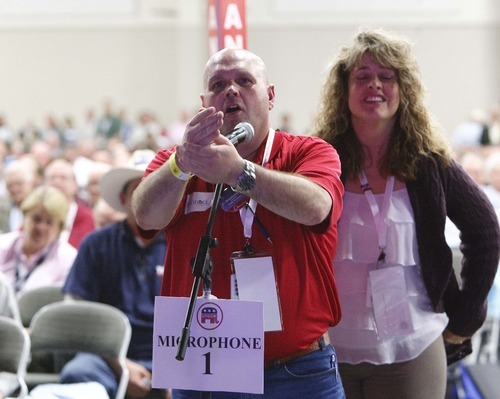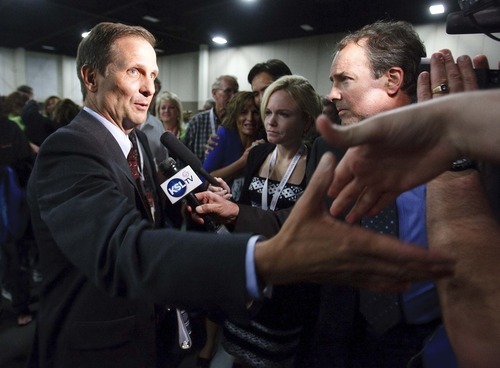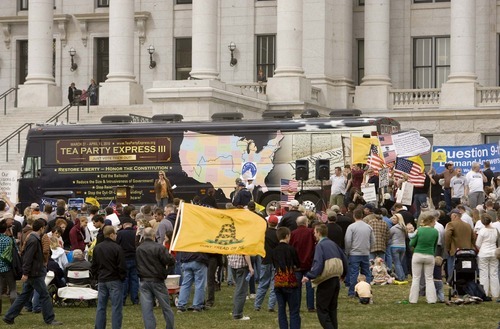This is an archived article that was published on sltrib.com in 2012, and information in the article may be outdated. It is provided only for personal research purposes and may not be reprinted.
Republican delegates had lingering bad feelings over the outcome of the 2nd Congressional District race, after a chaotic scene unfolded at the party's nominating convention.
And the tea party's support appears to have cooled from the boiling point it had reached in 2010, a new survey shows.
Nearly 37 percent of Republican delegates were dissatisfied with the outcome of the 2nd District contest, which saw Chris Stewart claim the party's nomination, according to a survey by the Center for the Study of Elections and Democracy at Brigham Young University.
The nominating process was marred by anonymous attacks, allegations by little-known candidate Milt Hanks of collusion among other candidates to bring down Stewart and a confusing sequence of candidates dropping out of the race and throwing support behind former House Speaker Dave Clark.
In the end, 51 percent of delegates were satisfied with the outcome, but it was by far the smallest percentage of the day. By contrast, two-thirds were satisfied with the outcome in the Senate race, 81 percent with the governor's race and 79 percent with the 4th Congressional District race.
"There was a lot of unhappiness with the process and a lot of confusion with the accusations and people dropping out and withdrawing and so on," said Quin Monson, associate director of the BYU center. "I think it was just a contentious and confusing day for those delegates, and they ended up wondering what the outcome would have been had it been a cleaner race."
The survey found that 21 percent of delegates were "very dissatisfied" with the 2nd District outcome, compared with 5 percent who expressed similar feelings about the Senate outcome and 6 percent in the governor's race.
The complete findings of the survey were posted on utahdatapoints.com, the center's political blog.
The delegate survey also found that Utah's tea party faction was watered down considerably at the state Republican convention, with delegate support for the movement and participation in the party both dropping sharply, according to the survey.
The delegate survey conducted after the April 21 convention found that support for the tea party dropped from 86 percent in 2010 — when tea party fervor led to the defeat of Sen. Bob Bennett — to 57 percent among this year's group of delegates. And those who were strongly favorable fell from about 47 percent to 15 percent.
Meantime, those who viewed the tea party unfavorably jumped from just over 10 percent to nearly 40 percent of GOP delegates. And the number of delegates who were active participants in the tea party dipped from 43 percent of the 2010 batch of delegates to 19 percent in 2012.
The BYU survey of Democratic delegates found that nearly 87 percent have a strongly unfavorable opinion of the tea party.
The diminished strength is likely due to a number of factors, said Ron Mortensen, political director with the Davis 9/12 Project, but the movement may have had less passion than 2010.
"Last time, there was a high level of intensity that dragged people out," he said. "They were mad at the bailouts, they're mad at these things and Bob Bennett was the target, and that united people and brought them together. This time the intensity wasn't there. There wasn't one person you're really targeting."
There was anger at Sen. Orrin Hatch, but Mortensen said the Hatch campaign did an exhaustive job of organizing his backers and targeting tea party supporters for defeat.
"The delegates probably were more anti-tea party because there was an effort made to replace [supporters] with people who were anti-tea party," he said.
There was also a surge in turnout, with 120,000 attending their neighborhood caucuses in March, in part because of the LDS Church's encouragement to its members to attend.
Monson said that evidence in other surveys shows that tea party backing remains high among conservative Republicans but lags among other segments of the party.
"I think the evidence we have from outside of the delegate survey suggests the tea party has lost its luster with the more moderate [Republicans]," he said. "This is where the increase in the turnout at the caucus and the effect of Hatch's campaign to get [his supporters] elected was a pretty big deal."
The results reiterate the findings of a poll conducted prior to the convention for the Utah Foundation, which found a similar drop in support for the tea party, both among Republican delegates and voters and a strong anti-tea party sentiment among Democratic delegates.
gehrke@sltrib.comTwitter: @RobertGehrke







